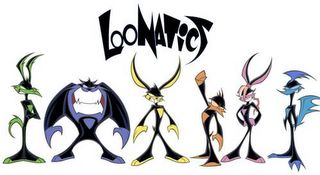
 Okay I know that this has been posted elsewhere a number of times, and I'm a bit of a Johnny Come-lately on this so sue me. The fact is that as Baby Herman said in Who Framed Roger Rabbit, this whole thing stinks like yesterday's diaper. Loonatics is a reimaging of Bugs Bunny and several other Looney Tunes characters as hip, fighting superheroes in a far distant future. Ministers of grace protect us the network weasels at Kids'WB and the Cartoon Network have flipped their lids!The characters (and the identity that they were developed from) are, from left to right:
Okay I know that this has been posted elsewhere a number of times, and I'm a bit of a Johnny Come-lately on this so sue me. The fact is that as Baby Herman said in Who Framed Roger Rabbit, this whole thing stinks like yesterday's diaper. Loonatics is a reimaging of Bugs Bunny and several other Looney Tunes characters as hip, fighting superheroes in a far distant future. Ministers of grace protect us the network weasels at Kids'WB and the Cartoon Network have flipped their lids!The characters (and the identity that they were developed from) are, from left to right:- Slick (Wile E. Coyote)
- Spaz (The Tasmanian Devil)
- Buzz Bunny (Bugs Bunny)
- Duck (Daffy Duck)
- Lexi (Lola Bunny from the Michael Jordan vanity piece Space Jam)
- Roadster (The Roadrunner)
According to a Warner Animation executive who should have remained anonymous but is in fact division president Sander Schwartz, "The new series will have the same classic wit and wisdom, but we have to do it more in line with what kids are talking about today." Dan Jallonari, president of Kids'WB, said that the network flipped over it: "We just said, `Wow, what a great way to take the classic Looney Tunes franchise that has been huge with audiences for decades and bring it into the new millennium.'" Of course Jallonari also mentioned what I take to be the real reason for developing the new show. According to him both boys and girls enjoyed the new action figures in the test runs of the show. In short, it's all about the toys.
The Looney Tunes characters belong to Warner Brothers and they can do what they want with them, and the idea of anthropomorphic animals with superpowers is not an entirely unheard of concept in animated movies and comic books. There have been "Mighty Mouse", "Marvel Bunny" (an animal counterpart of the original "Captain Marvel") and "Captain Carrot and the Amazing Zoo Crew" from DC Comics. It's not that part of the idea that I don't like. The big problem, beyond the assumption that the original characters were intended just for kids - everyone who worked in the animation industry when it was at its high point between 1930 and the mid-1950s was making cartoons for adults and kids together - is that they showed so little originality. Why base the new characters off of the original Looney Tunes characters? Why not create original characters? There are a lot of explanations, the most charitable of which is that the producers wanted a tie-in with known commodities, and the least charitable is that these people (the network weasels responsible) are simply incapable of being original. Regardless, I feel like Daffy Duck in the cartoon where everything keeps changing around him thanks to a malignant animator; confused and angry.


